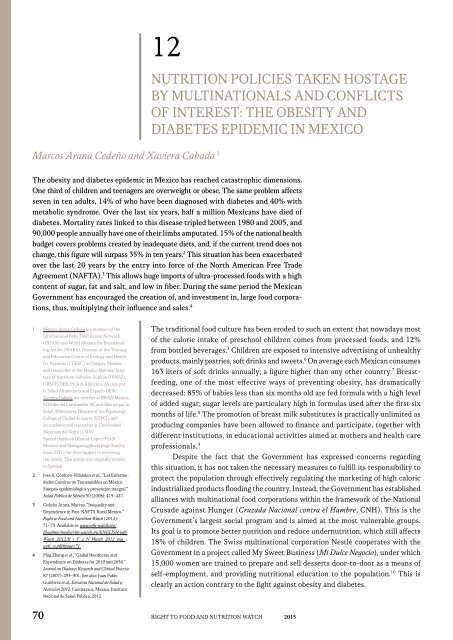RIGHT TO FOOD AND NUTRITION WATCH
1iNBHTY
1iNBHTY
Create successful ePaper yourself
Turn your PDF publications into a flip-book with our unique Google optimized e-Paper software.
12<br />
Marcos Arana Cedeño and Xaviera Cabada 1<br />
<strong>NUTRITION</strong> POLICIES TAKEN HOSTAGE<br />
BY MULTINATIONALS <strong>AND</strong> CONFLICTS<br />
OF INTEREST: THE OBESITY <strong>AND</strong><br />
DIABETES EPIDEMIC IN MEXICO<br />
The obesity and diabetes epidemic in Mexico has reached catastrophic dimensions.<br />
One third of children and teenagers are overweight or obese. The same problem affects<br />
seven in ten adults, 14% of who have been diagnosed with diabetes and 40% with<br />
metabolic syndrome. Over the last six years, half a million Mexicans have died of<br />
diabetes. Mortality rates linked to this disease tripled between 1980 and 2005, and<br />
90,000 people annually have one of their limbs amputated. 15% of the national health<br />
budget covers problems created by inadequate diets, and, if the current trend does not<br />
change, this figure will surpass 35% in ten years. 2 This situation has been exacerbated<br />
over the last 20 years by the entry into force of the North American Free Trade<br />
Agreement (NAFTA). 3 This allows huge imports of ultra-processed foods with a high<br />
content of sugar, fat and salt, and low in fiber. During the same period the Mexican<br />
Government has encouraged the creation of, and investment in, large food corporations,<br />
thus, multiplying their influence and sales. 4<br />
1 Marcos Arana Cedeño is a member of the<br />
International Baby Food Action Network<br />
(IBFAN) and World Alliance for Breastfeeding<br />
Action (WABA), Director of the Training<br />
and Education Centre of Ecology and Health<br />
for Peasants (CCESC) in Chiapas, Mexico,<br />
and researcher at the Mexico National Institute<br />
of Nutrition Salvador Zubirán (INNSZ),<br />
OBSCIUDES, Project Alimente, Alianza por<br />
la Salud Alimentaria and Espacio DESC.<br />
Xaviera Cabada is a member of IBFAN Mexico,<br />
El Poder del Consumidor AC and Alianza por la<br />
Salud Alimentaria, Director of the Psychology<br />
College of Ciudad de Juarez (ESPCJ), and<br />
an academic and researcher at Universidad<br />
Mexicana del Norte (UMN).<br />
Special thanks to Dinorah López (FIAN<br />
Mexico) and Manigueuigdinapi Jorge Stanley<br />
Icaza (IITC) for their support in reviewing<br />
this article. This article was originally written<br />
in Spanish.<br />
2 Jose A. Córdova-Villalobos et al., “Las Enfermedades<br />
Crónicas no Transmisibles en México:<br />
Sinopsis epidemiológica y prevención integral.”<br />
Salud Pública de México 50 (2008): 419–427.<br />
3 Cedeño Arana, Marcos. “Inequality and<br />
Depen dence in Post-NAFTA Rural Mexico.”<br />
Right to Food and Nutrition Watch (2012):<br />
71–73. Available at: www.rtfn-watch.org/<br />
fileadmin/media/rtfn-watch.org/ENGLISH/pdf/<br />
Watch_2012/R_t_F_a_N_Watch_2012_eng_<br />
web_rz.pdf#page=71.<br />
4 Ping Zhang et al., “Global Healthcare and<br />
Expenditure on Diabetes for 2010 and 2030.”<br />
Journal on Diabetes Research and Clinical Practice<br />
87 (2007): 293–301. See also: Juan Pablo<br />
Gutiérrez et al., Encuesta Nacional de Salud y<br />
Nutrición 2012. Cuernavaca, Mexico: Instituto<br />
Nacional de Salud Pública, 2012.<br />
70<br />
The traditional food culture has been eroded to such an extent that nowadays most<br />
of the calorie intake of preschool children comes from processed foods, and 12%<br />
from bottled beverages. 5 Children are exposed to intensive advertising of unhealthy<br />
products, mainly pastries, soft drinks and sweets. 6 On average each Mexican consumes<br />
163 liters of soft drinks annually; a figure higher than any other country. 7 Breastfeeding,<br />
one of the most effective ways of preventing obesity, has dramatically<br />
decreased: 85% of babies less than six months old are fed formula with a high level<br />
of added sugar; sugar levels are particulary high in formulas used after the first six<br />
months of life. 8 The promotion of breast milk substitutes is practically unlimited as<br />
producing companies have been allowed to finance and participate, together with<br />
different institutions, in educational activities aimed at mothers and health care<br />
professionals. 9<br />
Despite the fact that the Government has expressed concerns regarding<br />
this situation, it has not taken the necessary measures to fulfill its responsibility to<br />
protect the population through effectively regulating the marketing of high caloric<br />
industrialized products flooding the country. Instead, the Government has established<br />
alliances with multinational food corporations within the framework of the National<br />
Crusade against Hunger (Cruzada Nacional contra el Hambre, CNH). This is the<br />
Government’s largest social program and is aimed at the most vulnerable groups.<br />
Its goal is to promote better nutrition and reduce undernutrition, which still affects<br />
18% of children. The Swiss multinational corporation Nestlé cooperates with the<br />
Government in a project called My Sweet Business (Mi Dulce Negocio), under which<br />
15,000 women are trained to prepare and sell desserts door-to-door as a means of<br />
self-employment, and providing nutritional education to the population. 10 This is<br />
clearly an action contrary to the fight against obesity and diabetes.<br />
<strong>RIGHT</strong> <strong>TO</strong> <strong>FOOD</strong> <strong>AND</strong> <strong>NUTRITION</strong> <strong>WATCH</strong> 2015


